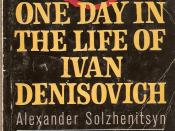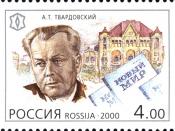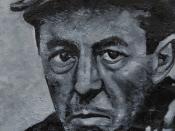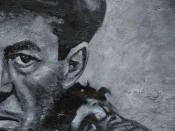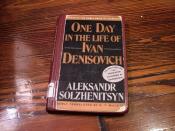How does Solzhenitsyn show Denisovich as a representative figure who copes with adversity in the book 'One day in the life of Ivan Denisovich'? The novel, 'One day in the life of Ivan Denisovich' by Alexander Solzhenitsyn is a story about a man who is in a prison for people who have committed political crimes. The story deals with a typical day for Denisovich and how he copes in this harsh and hostile environment. What interested me about the book was the way Denisovich was shown to handle the hard way of life and how he coped with adversity. In this essay I will explore the way in which Ivan Denisovich deals with them and by doing this what is the writer showing us.
The camp is a camp for people who have been accused of political crimes. It is in the cold weather conditions of Siberia where the prisoners are sent out to work day after day to construct buildings for the community and surrounding area.
This laborious work is surpost to change the prisoners way of thinking so that they can be returned back into society but most sentences last between ten and twenty five years so that when the men are given their freedom many of them do not adapt to the outside worlds way of life or many of them do not even make it out at all.
Ivan Shukov Denisovich left his home on the twenty third of June 1941 as a POW and ended up in prison after escaping from the Germans only to be charged with treason by the Russians. He hasn't been in the camp for the longest but has still been in for quite a while so many prisoners look up to him.
There are three main types of adversity which Denisovich has to deal with. They are domestic, social and political adversity. I will firstly look at domestic adversity which in this case looks at the way in which Denisovich copes with things in the domestic sense like meal times. Ivan copes in these situations by having rituals and small acts.
"Then he removed his hat from his clean-shaven head - however cold it might be, he could never bring himself to eat with his hat on." What this quote is showing is one of Denisovich's many rituals this is him in the freezing with only three small meals a day and he walks in and takes his hat of before eating. If I were him then I would not have cared about my hat, I would have just dived into the food. These little things he does help him cope because he is keeping his dignity by removing his hat as we would before eating a meal so this is an action we can all relate to and helps us to cope with things as well because it is common in our lives. What Solzhenitsyn wants to get across from this is that even though you are faced with all these problems around you, you still have to be dignified, proud and show that you will not be beaten. The writer is showing us Denisovich's self pride which, again, we can all relate to. Another small act that he does is he refrains from licking the bowl , again another act which allows him to be respected and keep his dignity. This is also deeply ironic as even though he has been unjustly imprisoned, he still has his table manners. The acts he does do have great significance because they are not just rituals which keep his dignity but they are also a statement about being held captive.
The second type of adversity Denisovich is faced with is social adversity. This is how he handles problems in group situations.
"Quote on giving food to others ant not asking for any thing in return." We can see that Denisovich is a kind man but also we see that by not accepting anything in return his respectability is left intact. Denisovich, through these small acts, is battling against adversity because he is saying that by keeping his dignity, he will not be overpowered by the surroundings he is in.
The prisoners entire day, from reveille to final count, is controlled by the authorities. Ivan is given no choice in what work he does and is not paid, yet he takes pride in the work he does. In working hard at his masonry and taking pride in building a good, strong, straight wall he is in effect subverting the prison authorities who seek to punish him by making him work. Denisovich, instead, is gaining self-regard by learning a new skill in prison and making his actions meaningful to himself. He finds a sort of freedom through work because he is no longer working for the authorities but, as his desire not to stop even when the end of day signal sounds, for himself.
The final aspect of adversity Denisovich must deal with is political adversity. Her Denisovich deals with the rules and regulations placed on him by the guards in the camp. He deals with these by keeping his head low, avoiding trouble, but on occasion having to break the rules to cope.
'Quote on him hiding his trowel for his next use' This shows that he is breaking the rules by hiding his trowel, so that he will get it each time he is working in that area. He knows this is wrong. He wants to keep the best for himself. He enjoys his work and wants to achieve a high standard. He needs the best of tools to do this. On the whole Denisovich isn't a rule breaker. He tries to abide by the rules by any way possible but in some cases he will break them to aid in his survival in the camp. This is not like stealing food to survive but things like hiding his trowel. These things help him to survive by keeping him sane.
Solzenitsyn has deliberately written in a flat and unenthusiastic way to heighten the routineness of the camp; the sameness of getting up, going to work, having breakfast, lunch, tea and going to bed. Denisovich has his own ways, including the rule breaking which make the routine more easy to cope with.
Denisovich is portrayed in the novel as a representative figure of one who copes with adversity. He completes tasks in a ritualistic way, taking pride in what he does and his achievements. In this respect, we know that he does cope with the troubles he is faced with. We too are faced with how we would cope with such a regime. What would we have to do to make life bearable? In most cases, we probably would not survive. In most cases, people would crack under the pressure. Denisovich does not. In so doing, he gives hope to humanity, by showing that one can get through the harsh times and cope with the adversities.
'A day with out a dark cloud. Almost a happy day.' This reflects the difference by which those in prison will measure things. This is a relative viewpoint. Our spirits are lifted, to know that Denisovich has survived another day. He is showing us that we can do the same. But solzhenitsyn uses the word 'almost' which suggests that it wouldn't be an actual happy day. This is because you measure things differently in prison. Something good for us would be heaven for Ivan and something bad for us would almost be normal for him. It is this difference that makes you think about how lucky we are not to be in his position and go through what he has gone through. The way he copes is a lesson we should all learn and this is what solzhenitshen is trying to get across.
To conclude, clearly Denisovich is developed by Solzenitsyn as a representative figure, coping with adversity, by way of his battling against the system and coming out on top. Denisovich accomplishes this by his rituals, his secrets and his pride in his work.

